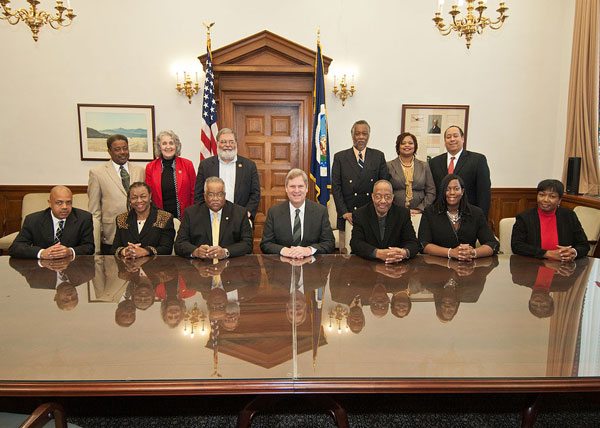
November 1, 2017; Washington Informer
“By 1910, African Americans held title to some sixteen million acres of farmland; by 1920 there were 925,000 Black farms in the country,” observes historian Pete Daniel in an article written for the Journal of Southern History. Yet, Daniel writes, later in the twentieth century, “Depression, mechanization, and discriminatory federal programs devoured Black farmers.”
The Federation of Southern Cooperatives/Land Assistance Fund (Federation), founded during the peak of the modern civil rights movement in 1967 to support Black farmers in the South’s “Black Belt,” turned 50 earlier this year, as Sarafina Wright details in the Washington Informer. According to the group’s executive director, Cornelius Blanding, the organization has three main goals: cooperative economic development, land retention, and advocacy.
As the Northeast Sustainable Agriculture Working Group (NSAWG) explains, the Federation was founded when “22 cooperatives from nine Southern states came together to form…an organization that would collectively support and advocate for Black farmers and rural communities across the South through economic development, training, policy advocacy, and organizing.”
When accepting NSAWG’s food sovereignty award two years ago, Blanding said, “We believe all land matters, but we especially want to say Black land matters. It matters to us in the South, it matters to our communities, it matters to this work, and it should matter to this world.”
Black farmers have often been denied federal resources. In fiscal-year 1983, Black farmers received 109 US Department of Agriculture (USDA) loans for a paltry $4.3 million. “Between 1910 and 1997,” notes NSAWG, “Farmland ownership among Blacks plummeted from a peak of 15 million acres to just 2.3 million and the number of Black farmers dropped from 218,000 to just 18,000, significantly outpacing the decline in the number of farmers overall.”
In response, the Federation supported a class action lawsuit against the USDA that centered around Tim Pigford, a Black tenant farmer. The resulting civil rights settlement, the largest in US history, led to $1.01 billion being paid to “15,600 Black farmers denied farm loans or other benefits because of their race.”
Not all Federation co-ops involve farming, however. As Blanding explained at a panel held earlier this year in New York City, co-ops form for many reasons. For example:
Sign up for our free newsletters
Subscribe to NPQ's newsletters to have our top stories delivered directly to your inbox.
By signing up, you agree to our privacy policy and terms of use, and to receive messages from NPQ and our partners.
- In Tennessee, Black farmers couldn’t buy gas, so they went across state lines to purchase it at a cooperative they formed.
- In Alabama, Black women couldn’t get jobs or were fired because they registered to vote, so they created quilting bee cooperatives.
- In Mississippi and Louisiana, Black farmers couldn’t get their goods to market because of discrimination by white truckers, so they established their own cooperative trucking business.
The Federation is well known in co-op and food circles, but not elsewhere. Ralph Paige, executive director from 1985 to 2015, was inducted into the Cooperative Hall of Fame in 2004. At the time, it was noted that “under his guidance the Federation has developed more than 200 units of low-income housing, 18 community credit unions, 75 cooperatives, and an award-winning rural training center. In addition, it has been the primary organization representing Black farmers and fighting the precipitous decline of minority land ownership and independence.”
Earlier this year, Paige’s colleague, John Zippert, and his wife Carol—“the first interracial couple married in Louisiana” back in 1967—were also inducted into the Cooperative Hall of Fame. John Zippert directed the federation’s Rural Training and Research Center in Epes, Alabama for 45 years, where he “helped former tenant farmers form the Panola Land Buyers Association buy 1,164 acres of land in 1970.” He also helped established a housing co-op in 1980 and “played a critical role in the Southern Grassroots Economies Project, which works to build democratic ownership in the US South and hosts CoopEcon, an annual training institute for cooperative members.” Carol Zippert was president and founder of the Greene Country Employees Federal Credit Union, which, in “one of the poorest counties in the US, built a credit union that has accumulated more than $1 million in assets.”
Blanding, who has worked at the Federation for nearly two decades and has been its executive director since 2015, observes that “our history is a shining example of what is possible when limited resource people and communities pool their resources and work cooperatively to solve their common problems and build organizations that are owned and controlled by those that use and benefit from them.” Yet Blanding also recognizes that the organization cannot rest on past achievement, saying, “When we are finished changing, we are finished.”
One new area of activity involves trying to reinvigorate membership control of rural electrical co-ops, as Kate Aronoff profiled in Dissent this past summer. Nationally, electric co-ops provide power to 42 million Americans in 47 states. Zippert, reports Aronoff, has worked “with member-owners of the Black Warrior Electric Membership Corporation to make it more democratic.” The 26,000-plus membership is 60 percent Black, but “up to this point,” Zippert says, “they have not had a Black board member.” A few co-ops fare better. Aronoff notes that the Roanoke Electric Cooperative has a majority Black board and staff. Aronoff adds:
Its programs extend well beyond electricity…Roanoke has sponsored a Sustainable Forestry and African American Land Retention Program, assisting 117 landowners with everything from financial support to timber management.
Electric co-ops also “enjoy direct access to the USDA’s rural development funds. A recently developed program…[allowing] co-ops to perform upgrades to member-owners’ homes and their own equipment at no up-front cost.”
There is, of course, much more. NSAWG highlights the Federation’s efforts to clear title to preserve remaining Black-owned farmland. The Federation also has five state-level offices that work on cooperative economic development, provides technical assistance to existing co-ops, conducts trainings in sustainable agriculture, and promotes youth empowerment. The group has also assisted farmers developing co-ops abroad in Haiti, Cuba, the Caribbean, and Africa.
Blanding emphasizes the organization’s grassroots nature as key to its agility. Each co-op member has a vote and say in the Federation’s direction. The “networks are truly built from the ground up and have to be built on need in order for them to be sustainable.”—Steve Dubb













